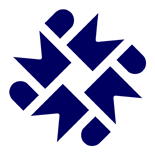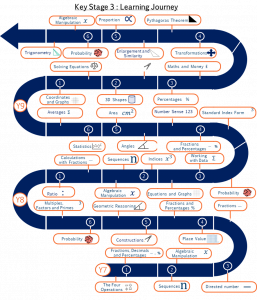Key Stage 3: Mathematics
Curriculum Intent
Mathematics is a creative and highly inter-connected discipline that has been developed over centuries, providing the solution to some of history’s most intriguing problems. It is essential to everyday life, critical to science, technology and engineering and necessary for financial literacy and most forms of employment.
At Murray Park School we have planned our curriculum to ensure that our students are provided with a foundation for understanding the world, the ability to reason mathematically, an appreciation of the importance of mathematics, alongside instilling a sense of enjoyment and curiosity about the subject.
The beauty of Mathematics is that it has so many links in which students need to be able to move fluently between, therefore, we have ensured that we have programme of study for key stage 3 that is organised into the core fundamentals of Maths, but also allows students to build upon the knowledge gained in prior stages and make connections across mathematical ideas to develop fluency, mathematical reasoning and confidence in solving more complex problems.
By following the national curriculum for mathematics we ensure that our students will be able to:
- become fluent in the fundamentals of mathematics, including through varied and frequent practice with increasingly complex problems over time, so that students develop conceptual understanding and the ability to recall and apply knowledge rapidly and accurately;
- reason mathematically by following a line of enquiry, forming relationships and generalisations and developing an argument, justification or proof using mathematical language;
- solve problems by applying their mathematics to a variety of routine and non-routine problems with increasing sophistication, including breaking down problems into a series of simpler steps and persevering in seeking solutions.
We know and appreciate that Mathematics can be hard, but we want our students to grapple and flourish with the exciting opportunities we have to offer in the depths of exploring different contexts.
Curriculum Overview
All students in key stage 3 follow the National Curriculum. The yearly teaching programmes for Years 7 to 9 are set out by the National framework and are organised in five main Mathematics strands. The areas covered are:
Number
Ratio and Proportion
Algebra
Geometry and Measures
Probability and Statistics
Numeracy
Numeracy is not mentioned in the above strands as this is crucial through all of the mathematics taught. Numeracy is the ability to be able to use mathematics in the real world and apply it to make the best possible decisions. Our curriculum has been designed in order to allow students to have the opportunity to explore and link to real life contexts of Mathematics, through the application of percentages to look at calculating interest rates on bank accounts and working out prices in sales, to calculating the amount of ingredients needed in a recipe when cooking for more or less people and calculating costs for redecorating rooms to name a few. Numeracy skills are equally as important as literacy skills and are fundamental to everyday life.
Key Stage 3 Curriculum
We have ensured that over the three year key stage 3 we build upon the students’ mathematical skills in each year, checking that the foundations of each skill are secure before extending, which enables our students to recall and retrieve prior knowledge. Our students all have the same opportunities to access the content delivered within the National curriculum and are stretched in every area. To support the delivery of our curriculum, we set frequent assessments and use pre and post testing to ensure that our students are accessing a programme that is tailored to their needs.
The students in Year 7 start by looking at the number system and place value which allows the students to have a full understanding of what the number system means and represents. The students then explore different number systems, they are able to explore, justify and reason when using different applications of number and they will begin to link this knowledge to other areas of mathematics, such as Algebra, Area, Perimeter and Volume. In the spring term the students are introduced to algebraic manipulation, learning simplification and application. The students study Geometry by knowing and recalling the properties of shapes and looking at key angle facts that are required. This unit is then followed by the introduction probability, the year finishes with looking at factors, multiples and primes, along with reasoning and proof on these areas.
The students in Year 8 start by working with proportion, focusing on the use and understanding of ratio, before retrieving their knowledge of number from the previous year with revisiting fractions and enhancing these skills with the introduction of algebraic fractions. The students then solve equations, inequalities, recognise sequences and substitute into formulae. In the spring term, the students further their knowledge of equations by linking to graphs and different representations of algebra. This leads on to linking with number sense, where the focus lies with Standard form and fractions decimals and percentages. Once confident in these skills, the curriculum moves to geometry. This is where students will focus on extending their knowledge of the properties of 2d shapes and working with angle laws. The year ends by finding and using averages from different data sets, being able to use, compare and explain what each represent.
The students in Year 9 will begin with ensuring that they are confident at using, plotting and the properties of straight line graphs before recalling solving equations and linking to substitution into expressions. Followed by investigating properties of 3D shapes. In the spring term, students will extend upon their knowledge of percentages and begin to look at financial mathematics. Followed by the introduction to Pythagoras’ Theorem and they will learn how this can be applied and used in real life contexts. The term ends with the students studying probability, using skills that have been built through the previous modules to allow them to calculate accurately probabilities of events and algebraic manipulation and representations.
Extra-curricular activities
The Department provides Booster sessions to help the students to focus on their areas for improvement.
Useful Websites
Alongside the teaching in the classroom, students will be directed to use the following websites for homework purposes or for revision materials:
TTRockstars – www.ttrockstars.com
Sparx maths – https://www.sparxmaths.uk/


